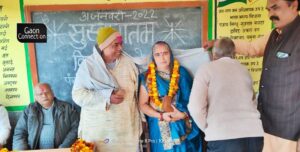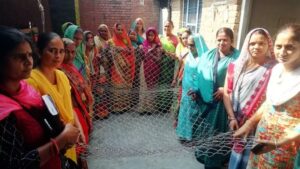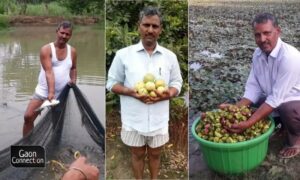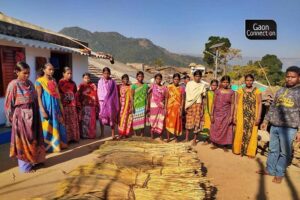They have to work harder than ever. Their day starts at the crack of dawn and after toiling at home they set off to earn their bread and butter from their own enterprise, a restaurant they call Dolphin.
Five fisherwomen from Poompuhar, a small fishing village in Nagapattinam district of Tamil Nadu, about 275 kilometres from the state capital, Chennai, are rewriting their stories, by ‘daring’ to be innovative.
Stella Gracy, Silvarani, Rajkumari, Uma, and Pushpvalli got together and started a small seaside restaurant called Dolphin in 2016, where they serve fresh and local vegetarian and non vegetarian specialities to their guests on banana leaves. These include idlis, vada, puri, chapati, and of course curries made from freshly caught fish served with rice.
Also Read: Puthandu Vazhuthugal: Neem flowers, jaggery and raw mangoes on Tamil New Year
From poverty to self reliance
Five years ago, each of the women was leading a hand to mouth existence. “I had no money to pay my children’s school fees,” Stella Gracy told Gaon Connection. The 35-year-old and her husband were in debt. “My husband was catching fewer and fewer fishes and was selling the catch to middlemen at throwaway prices,” she said.
Today, these women not only own a business but are also earning Rs 10,000 each a month from their restaurant. They are in the process of expanding their reach and will soon be delivering up to 200 orders a day to nearby towns.
Also Read: Lockdown, followed by two months fishing ban; Koli fisherwomen are on the edge
It was a difficult journey. The women come from a small fishing village that is tradition bound, has very rigid notions of what a woman should and should not do, and very patriarchal. Most women in the village work long hours, earn a pittance and invariably watch helplessly as their men take to drinking.
Stella tried very hard to earn an extra income by drying and selling fish. But that just fetched her a pittance of Rs 2,000 a month. Stella said while she was used to hard work, it was getting her nowhere and she was fed up.
“We live in a conservative society where women are expected to cook tasty food from birth till death, but never empowered to enter professional kitchens,” said Stella.
But that thought stuck in her head and the more she thought about it, the more determined she was to cook professionally and earn an income from that.
“It means we have to multitask more than usual, but we are used to that,” she smiled.
Also Read: Lockdown enforced when they were at sea — so more than a lakh of fishers now wait in deep waters
A strong business plan
“We built a strong business plan,” Silvarani, one of the partners, told Gaon Connection with pride.
The idea for the restaurant came about when they realised that the many fishers and traders who came to Poompuhar to do business had no place to eat in. “We decided to look for a place near where they did business,” the 35-year-old said.
But they had no money to invest.
According to the Ministry of Women and Child Development, Government of India, there are schemes to empower fisher women. On paper, in the last seven years, approx. Rs 31,000 lakh has been set aside to help them in Tamil Nadu.
But, Stella and her partners have not been able to access any of the schemes that provide loans for start-ups at subsidised interest rates.
But that did not deter them and they managed Rs 75,000 from relatives and another lakh of rupees from private moneylenders to set up the restaurant and the kitchen at Dolphin. “We called our restaurant Dolphin, because it is a unique creature, different from other fishes,” smiled Stella.
Breaking the mould
So, they bargained and managed to rent 1,250 square feet of land for which they pay Rs 1,000 a month. They cleared the land of its undergrowth themselves, and constructed a hut with bamboo walls and a thatched roof.
It was a bumpy start. Especially when they had to contend with disapproval from fellow villagers. “Women are not even allowed to sit with the men, and the fact that we had dared to start a business on our own without any male involved did not go down too well,” Silvarani laughed.
But the five fisherwomen put their heads down, cooked and served food at their restaurant and even managed to repay their debts.
Soon, they were doing brisk business and were catering for several functions in the villages from celebrating birth of babies, weddings and even funeral feasts. And they kept the price point reasonable.
Initially they were getting orders for at least 60 meals a day. Now it is almost 200 orders a day and even during the pandemic they continue to do takeaways. It is Rs 60 for a vegetarian meal and Rs 120 for a non-vegetarian one.
Rajkumari, the 42-year-old head chef of the restaurant, told Gaon Connection, “A housewife’s cooking skills are often under-valued. But, even at home, I used to experiment with new dishes and standardise the recipe so that the dish would taste the same every time I made it. I apply the same techniques professionally now for bulk orders,” she added.
Rajkumari said that their Vatha Kuzhambu (a spicy curry eaten with rice) and their Rava Kesari (a halwa made with semolina) were popular.
“I work with pride now. Earlier I was hesitant to come out and serve strangers, especially men,” Uma, who serves food at the restaurant and packs the takeaways, told Gaon Connection. The 38-year-old said she had gained confidence working in her own enterprise, something she couldn’t have even dreamt of before.
The oldest partner is Pushpavalli who at 65 years of age is responsible for procuring ingredients and fresh seafood that she gets at the harbour every day. But, Rajkumari pointed out that they were all involved in all aspects of the restaurant.
A ripple effect
Dolphin became a story of success not just for these five women. They extended their experience and expertise to other interested women in the villages so that they could start their own business too. This motivated three more village women to start their own eateries.
“But if we want to alleviate poverty at grassroot level, low-income women need strong training and funding for small enterprises,” Stella said. “We learnt by trial-and-error method as there was no one to guide us or support us financially,” she pointed out.
Gradually, when they established themselves, a Nagapattinam-based non profit called SNEHA (Social Need Education and Human Awareness) helped them out with getting equipment for their kitchen, such as a rice grinder that made their lives so much easier, they said.
The five fisherwomen freed their husbands from the vicious circle of debt. While in the lean season the fishing activities of the village slow down and often stop entirely, Dolphin remains active supplying takeaway orders, and vending hot fish snacks on a cart to nearby areas.
The life of the fisherwomen is a difficult one, often fraught with anxiety and tragedies. “We worry non stop when our husbands are out in the sea,” Stella said. There are times the sea claims lives of fishermen leaving their families helpless. “So, I motivate women to become independent so they can become independent and face any adversity life throws at them,” she said.
Eva Badola is an independent exploratory writer who engages in climate change and social injustices issues. Her book, ‘Stories of Success: Narratives from a Sacred Land…’ covers stories of good practices.



















